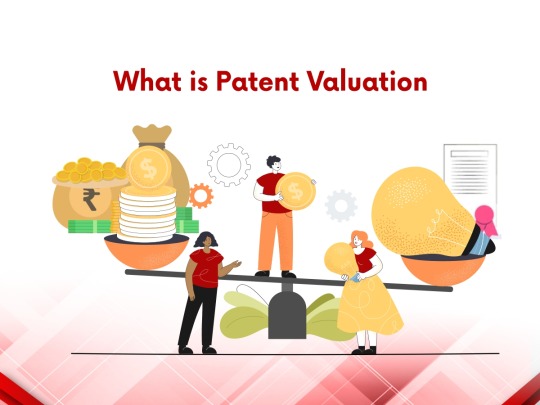#valuation methods
Explore tagged Tumblr posts
Text
8 Valuation Methods for Startups You Should Know
Starting a business is an exhilarating journey, but one thing that often makes entrepreneurs anxious is figuring out just how much their company is worth. Whether you're preparing for your first investment round, selling your startup, or negotiating a partnership, knowing how to value your startup is crucial. While there isn’t a one-size-fits-all method, understanding the different valuation techniques can help you make informed decisions.
In this post, we’re diving into eight of the most popular valuation methods for startups. Each method comes with its strengths and weaknesses, and the one you choose depends on your business model, industry, and the stage of your startup.
1. Market Comparable Approach
The Market Comparable method is based on comparing your startup to similar companies in your industry. Think of it as shopping for a new car and checking out how much other similar models are selling for. If other tech startups with similar revenues and growth potential are valued at $5 million, your startup might fall within a similar range—unless you have some distinguishing features that set you apart.
This approach is ideal for early-stage startups or those with minimal financial data, as it relies heavily on market data rather than internal projections.
2. Income Approach (Discounted Cash Flow)
The Income Approach, often referred to as the Discounted Cash Flow (DCF) method, is perfect if you have predictable future cash flow. This valuation technique takes into account your company’s future revenues and discounts them to present value. Think of it like calculating the net present value of an annuity, where the future earnings are worth less today due to the time value of money.
This method is ideal for more mature startups with a solid customer base and predictable cash flow. However, it can be tricky to estimate future earnings accurately, which is why it's often combined with other methods.
3. Asset-Based Valuation
Asset-based valuation is all about the value of your startup’s tangible and intangible assets. This method is typically used for startups that have a lot of physical assets or intellectual property but lack consistent earnings. For example, if your startup owns valuable patents, real estate, or machinery, this method will factor those into the overall valuation.
The downside? This approach doesn’t take into account future growth potential, which means it might undervalue companies in high-growth industries, like tech startups.
4. The Berkus Method
Named after venture capitalist Dave Berkus, this method focuses on a more subjective valuation based on a startup's risk factors. The Berkus Method assigns a specific value to various factors like:
Sound Idea: Is the concept strong?
Prototype: How developed is the product?
Quality Management Team: Do you have a solid leadership team?
Strategic Relationships: Are there key partnerships or customers in place?
For early-stage startups, the Berkus Method can help assess qualitative factors that aren't easily quantified. It’s a more “gut-feel” approach, which means it’s often subjective but useful when you’re just starting out.
5. Risk Factor Summation Method
This method involves assessing the key risks associated with your startup and assigning a value based on how each risk factor might impact your business. Factors might include:
Market risk
Financial risk
Technological risk
Regulatory risk
Management risk
For each of these categories, you assign a value (positive or negative), and the sum determines the startup's valuation. This method helps investors look beyond financial data to assess how likely your business is to succeed in the future.
6. Scorecard Valuation Method
Similar to the Berkus Method, the Scorecard Method focuses on assessing your startup's potential based on a series of key criteria. However, this approach is more structured, using a weighted scoring system. Criteria might include:
The strength of the founding team
Market size
Competition
Product/market fit
Traction and sales to date
Each of these factors gets a score, and then those scores are weighted to produce a final valuation estimate.
7. The Venture Capital (VC) Method
The VC Method is commonly used by venture capitalists to estimate the value of a startup in its early stages. It works by estimating your startup’s potential exit value (how much it could sell for down the line) and then working backward to determine the current value. This method uses a target return on investment (ROI) to come up with a valuation.
While this method may seem overly simplistic, it’s incredibly useful when you’re seeking funding. It helps investors evaluate how much return they can expect on their investment.
8. The First Chicago Method
This hybrid approach combines several of the methods mentioned above, including discounted cash flow (DCF), risk factor summation, and market comparables. It’s most often used by investors who want to consider multiple scenarios (such as best-case, base-case, and worst-case projections) to estimate the potential outcomes for the startup.
While this method can be more complex, it allows for flexibility in forecasting and can give you a range of valuations depending on different assumptions.
In Conclusion
Valuing your startup is no easy task, but by understanding the different methods available, you can make a more informed decision. Whether you're considering investment options, fundraising, or planning an exit strategy, knowing which valuation method works best for you will ensure that you're not leaving money on the table.
Want to learn more about how to accurately value your startup? Check out this comprehensive guide on 8 Valuation Methods for Startups to dive deeper into each approach and find out which one works best for you!
0 notes
Text
Understand Company Valuation Methods for Startups in India
As you might imagine, distinguishing the value of a business isn't simple—it requires accounting for several factors within your finances. Because this process is so complex, many business owners work with a professional to receive an objective, detailed evaluation of what their business is worth. In the current scenario, if you need to determine the value of your business, it's worth understanding how this process works. In this blog, we'll break down some of the primary valuation methods for startups, how they work, and how each approach may (or may not) benefit your business. Let's explore!

0 notes
Text
Financial Statement Analysis Course: Decode Company's Financial Health
Are you looking to enhance your knowledge on financial statements? Look no further, as this Financial Statement Analysis Course is here to guide you through analyzing a company's financial health with precision.
In this comprehensive 5-module, 1.5-hour course, you'll gain valuable insights into three pivotal financial statements: the Balance Sheet, Profit and Loss Statement, and Cash Flow Statement.
Our expert instructors will guide you through decoding company financial statements and analyzing each statement's vital aspects. You'll learn to identify critical indicators, assess financial health, and confidently navigate the dynamic world of fundamental analysis.
By the end of this course, you'll have the expertise to uncover hidden gems within balance sheets, understand profit drivers and revenue intricacies, and evaluate sustainability and liquidity.
So, what are you waiting for? Start learning and achieve financial triumph today!
Course Outline:
Understanding Financial Statements
Decoding Balance Sheet of a company
Analyzing Company's Profit & Loss Statements
Mastering Cashflow Statement of a company
Using Ratio Analysis on Balance Sheet, Profit & Loss Statement & Cash Flow Statement
What you will get:
PDFs
Flashcards
Assessments
Certificate of Completion.
#financial ratio analysis#valuation methods#accounting ratio#ratio analysis in accounting#methods of valuation of shares#define ratio analysis
0 notes
Text
Why startup valuation slides are important?
Startup valuations can be a tricky subject. As an early-stage startup seeking investment, you need to understand how investors view valuation and what factors impact their perception. Your valuation slide deck is a key tool for clearly communicating your company’s worth to potential investors. Here’s why your valuation slides matter and how to create an effective deck:
Importance of Valuation Slides
– Sets expectations for investment terms. Your valuation sets the stage for the percentage of equity investors will require and the valuation caps for convertible notes. An unrealistically high valuation can turn off investors.
– Demonstrates your understanding of valuation methods. Using standard valuation methods like discounted cash flow analysis and comparable transactions shows investors you have a solid grasp of how startup valuations work.
– Supports your assumptions. Your valuation is based on certain assumptions about the market, your traction, future growth, etc. Investors will scrutinize these assumptions closely.
– Allows investors to benchmark you. Investors will compare your valuation to other startups at your stage in your industry. Your valuation needs to be defensible within this peer group.

Key Elements to Include
– Valuation history. Cover previous valuation events, like seed funding rounds, showing the progression of your valuation over time.
– Revenue growth forecasts. Project your revenue growth month-by-month or quarter-by-quarter for the next 3-5 years. Tie your assumptions to drivers like customer acquisition costs.
– Market size estimates. Include TAM (total addressable market) analysis to quantify your potential market opportunity. Refer to market research reports.
– Comparable transactions. Identify 3-5 startups in your space at a similar stage who have been acquired or gone public. Show their valuations at those liquidity events.
– Valuation methods. Use 2-3 standard methods like discounted cash flow, multiples of revenue, etc. to derive a sensible valuation range.
– Capitalization tables. Include cap tables showing the breakdown of equity ownership between founders, investors and stock option pools.
Download Sample Valuation Report
Valuation slide deck
Remember, your valuation slide deck is a key tool for demonstrating your startup’s progress and potential. Build persuasive slides that clearly communicate all the elements that drive your valuation. With a compelling deck in hand, you can have more productive conversations with investors.
#Sample Valuation Report#Valuation slide deck#valuation methods#startup valuation#startup valuation tool#online startup valuation calculator#startup valuation calculator#valuation calculator startup#early-stage startups with no revenue#valuating early-stage companies
0 notes
Text
#business valuation#business valuation melbourne#business valuation services#business valuation firm#business valuation methods#independent business valuation#accounting business valuation#online business valuation#online business valuation services#business valuation report#Business Valuation Firm in Melbourne#company valuation consultant in Melbourne
1 note
·
View note
Link
#estimation#FindQo.ie#ireland#landlords#method#pricing#properties#property#rentalincome#RPZ#Valuation
0 notes
Text
Entering my villain era (chewed someone out in youtube comments)
#there’s this guy in the language learning community who’s just.. blatantly a grifter#that doesn’t narrow it down in the slightest and it’s not supposed to#anyway he’s being called out for making a shitty course based on bullshit claims and he’s trying to defend himself#saying ‘but i’m charging a tenth of what this content is actually worth waaaaa’#i finally just decided to blast him and went ‘based on WHAT. how the hell is your course worth $5000. who valued that.#that’s a semester or a year of tuition at a lot of universities. is your course degree level then? what’s this valuation based on???’#i fully don’t expect a response; in fact if anything i expect him to cry because i accused him of lying about both his level of mandarin#and how long it took him to achieve#but if you seriously fucking made it to c1 level of mandarin; as an english speaker; in ONE year; with no prior study… you are a savant#oh oh but you didn’t. did you? you studied japanese first so you already knew the characters#and it actually took you three years not one. didn’t it? and you didn’t learn just from comp input? did you? you had your girlfriend#and your in laws and tutors to practice with? and you had grammar books? didn’t you?#and now you’re turning around trying to get people to pay you based on false claims and an impossible dream#i literally do not believe you. i don’t!#this man could maybe do one of two things to get me to believe him#either he could grab someone who doesn’t know chinese and coach them using his method for one year and test them and see if they’re at C1#(i need to point out here - chinese doesn’t use the same framework of proficiency levels as european languages. so it’d actually be hsk5#that that person would have to obtain. in a year. crazy and unlikely tbh)#OR he could take his methods and apply them to an unknown-to-him language and work on it for a year and see if he gets to c1#to be honest it should probably be something that’s about as difficult for an english speaker as mandarin is. i’m thinking thai or arabic#that said i don’t believe anything that comes out of this clown’s mouth or his keyboard. so#personal
0 notes
Text
Business Valuation for Startups - Shuraa Tax

Starting a business is exciting, but understanding its worth is crucial for securing investments, partnerships, and long-term success. Startup valuation is the process of determining the value of a new business, considering various factors such as revenue potential, market trends, and growth prospects. Accurate business valuation for startups helps founders attract investors, negotiate fair deals, and plan financial strategies effectively. This blog delves into the significance of startup company valuation, explores the challenges faced, and discusses various start-up valuation methods to ensure a precise assessment. Determining an accurate startup valuation is a critical step for entrepreneurs seeking investments and business growth. With various startup valuation methods available, choosing the right approach depends on factors such as industry trends, financial projections, and market positioning.
#startup valuation#business valuation for startups#startup valuation methods#start up valuation#startup company valuation
0 notes
Text
Effective Analysis of Patent Valuation

Einfolge is a patent valuation services provider that provides in-depth evaluations to ascertain the monetary value of intellectual property. With the use of cutting-edge techniques and industry knowledge, Einfolge assists customers in determining the market value and financial potential of their patents. Their customized solutions support strategic choices, guaranteeing the best possible use of intellectual property in cutthroat marketplaces.
0 notes
Text

In the bustling world of startups, where innovation meets ambition, there exists a cryptic yet crucial concept that can make or break the dreams of aspiring entrepreneurs — startup valuations. It’s a tale of numbers, strategies, and a touch of mystique. Join me as we unravel this enigma and explore the intricacies of startup valuations.
#startup valuation#startup valuation calculator#startup valuation methods#unicorn startup valuation#how to calculate startup valuation#startup valuation india
0 notes
Text
Unlock the potential of passive income through strategic real estate investments in India. Explore diverse opportunities and discover how the dynamic real estate market can be a lucrative source of ongoing revenue. Our curated guide provides insights into passive income sources in the Indian real estate landscape.
#Principal Methods of Real Estate Income Generation#Passive Income Sources in India#How can real estate generate income?#What are the methods of income approach?#What are the three methods of valuation of real estate?#What are the 5 methods of valuation?#Real Estate Income#Real Estate#Bricksnwall
0 notes
Text
Strategic Growth Made Easy with Our Valuation Tool
When you’re in the early stages of your startup journey, every decision counts. From securing funding to setting realistic goals, the path to success is paved with strategic choices. But what if we told you that there’s a tool that can simplify one of the most critical aspects of your startup’s growth – its valuation?
Introducing Our Startup Valuation Tool
At VALUATIONGENIUS, we understand the unique challenges faced by early-stage startups, especially those with little to no revenue. Valuing your venture can be a complex and often overwhelming task. That’s why we’ve developed an easy-to-use online startup valuation tool that takes the guesswork out of calculating your startup’s potential worth.
A Blend of Traditional and Innovative Methods
Our approach combines the best of both worlds – traditional and cutting-edge valuation methods. By leveraging the strengths of these methods, our online service provides you with a comprehensive valuation report in just a matter of minutes. Say goodbye to lengthy, complicated calculations and hello to a more efficient way of determining your startup’s value.
Save Time and Money
Time is of the essence for startups. Every minute you save is a minute you can invest in strategic planning and growth. Our platform not only simplifies the valuation process but also allows you to generate reports swiftly, saving you valuable time. Additionally, our service comes at a cost-effective price point, making it accessible to startups with varying budget constraints.

Multiple Valuation Scenarios
One size doesn’t fit all in the startup world. We understand that different startups have unique needs and goals. Our tool offers multiple valuation scenarios, allowing you to explore various possibilities. Whether you’re projecting future cash flows, revenue generation, or investor returns, our platform has you covered.
Empowering Early-Stage Startups
Our mission is to empower early-stage startups with the insights they need to make informed decisions. With our valuation reports in hand, you can chart a course for your startup’s growth that is based on real data and analysis. Whether you’re seeking funding or planning your next strategic move, our tool equips you with the knowledge to make confident choices.
Ready to Get Started?
Unlock the full potential of your startup with our easy-to-use online valuation calculator tool. Say goodbye to the guesswork and hello to data-driven decision-making. Get started today and discover how our platform can help you strategize for success.
Don’t miss out on this valuable resource for your startup journey. Join us in the pursuit of strategic growth and excellence.
#startup valuation#startup valuation tool#online startup valuation calculator#startup valuation calculator#valuation calculator startup#valuation methods
0 notes
Text
Unlocking the Future of Education: Navigating Optimal Study Methods in 2024 and Beyond"
1 note
·
View note
Text

Methods of Company Valuation: A Look into the World of Business Assessment
Determining the value of a company is a critical aspect of financial analysis. It helps stakeholders, investors, and entrepreneurs make informed decisions regarding buying, selling, or investing in businesses. Multiple methods are used to calculate a company's value, each offering unique insights into its worth. One platform that offers comprehensive courses on company valuation is Quest by Finology. The platform's valuation courses equip individuals with the skills and knowledge necessary to understand and apply these techniques effectively.
Here are some commonly used methods of company valuation:
Market Capitalization: Market capitalization is a straightforward and widely recognized method. It calculates a company's value by multiplying its stock price by the total number of outstanding shares. However, it's important to note that market capitalization might not always accurately reflect a company's intrinsic value due to market sentiment and investor behaviour.
Earnings Multiples: This method assesses a company's value by comparing its earnings (such as EBITDA or net income) to similar companies in the industry. By applying a multiple to the earnings, an estimate of the company's worth can be derived. However, it is essential to consider industry average multiples and other relevant factors to ensure an accurate valuation.
Asset-Based Approach: The asset-based approach focuses on the net value of a company's assets and liabilities. It involves subtracting liabilities from assets to determine the company's net worth. This method is particularly useful for companies with significant tangible assets, such as manufacturing firms. However, it might not adequately capture intangible assets and future earnings potential.
Discounted Cash Flow (DCF) Analysis: DCF analysis is a popular valuation method that projects a company's future cash flows and discounts them to their present value. This approach considers the time value of money and provides a comprehensive assessment of a company's intrinsic value. However, it requires accurate cash flow projections and the selection of an appropriate discount rate.
Comparable Transactions: Comparable transactions involve analyzing previous transactions involving companies within the same industry or with similar characteristics. By examining the terms and prices of these transactions, one can gain insights into the market value of the company being valued. However, it is crucial to consider the comparability of transactions and adjust for any differences.
Quest by Finology offers courses on company valuation that delve into these methods and provide individuals with a comprehensive understanding of the techniques. The courses go beyond theoretical knowledge and include practical case studies and best practices in the field. By exploring these courses, individuals can enhance their financial analysis skills and make well-informed decisions based on accurate valuations.
In conclusion, understanding the methods of company valuation is crucial for assessing a business's worth. Each method offers a unique perspective on a company's value, taking into account various factors such as financial performance, market dynamics, and industry trends. Platforms like Quest by Finology provide individuals with an opportunity to gain insights into these valuation techniques and acquire the skills necessary to perform accurate assessments.
0 notes
Text
The Dynamics & Methodologies of Startup Valuation
In entrepreneurship and investment, a critical puzzle piece often perplexes founders and investors: startup valuation. It's a pivotal aspect that determines the worth of a company in its early stages, yet the methods used to determine this value are as diverse as the startups themselves. Valuing a startup involves a blend of financial analysis, market dynamics, potential growth, and investor sentiment. To explore its essence, significance, and diverse methods, let's dive deeper into this complex yet critical domain.
0 notes